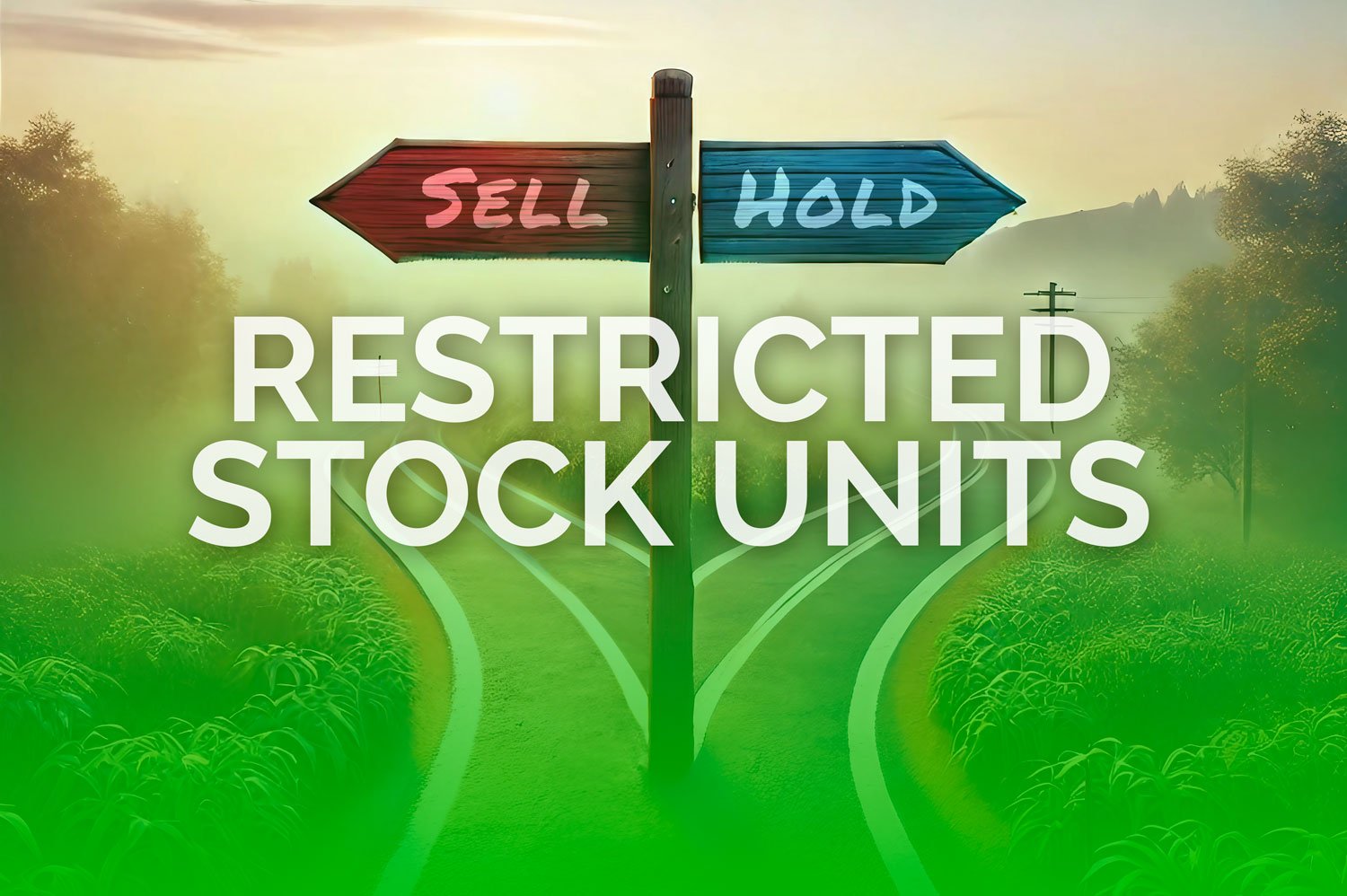Restricted Stock Units (RSUs) are a common form of compensation that companies offer to their employees. These units represent a promise by the employer to give the employee shares of the company’s stock at a future date, usually after certain conditions like time-based vesting or performance goals are met. RSUs are increasingly popular as they align the interests of employees and employers, offering potential wealth creation beyond the regular paycheck.
However, while receiving RSUs can feel like winning the lottery, cashing in on them without a plan can lead to significant financial pitfalls. Strategic selling of RSUs is crucial because their value can fluctuate significantly due to market conditions, tax implications, and personal financial goals. Without a smart strategy, you could leave money on the table—literally.
In this article, we’ll dive deep into the intricacies of RSUs, explore factors affecting your decision to sell, and uncover strategic selling strategies that can help you maximize your financial gain. By the end, you’ll be better equipped to make informed decisions about your RSUs, ensuring you don’t miss out on potential wealth.
Table of Contents
Understanding RSUs
Before diving into strategies, it’s essential to understand what RSUs are and how they work.
Getting to Know RSUs: What They Are and How They Work
RSUs are essentially promises made by your employer to give you company shares after meeting specific conditions, usually related to tenure or performance. Unlike stock options, RSUs do not require you to purchase the stock at a set price. Instead, once your RSUs vest, you own the shares outright without any cash outlay.
For example, if you receive 1,000 RSUs from your employer, and these units vest over four years, you would receive 250 shares each year, assuming you stay with the company.
Vesting Schedules
Vesting is the process by which you earn your RSUs. It’s common for companies to implement a vesting schedule to ensure employees remain with the company for a certain period. Vesting schedules can be time-based, where shares vest over a specified number of years, or performance-based, where shares vest after achieving certain company or individual performance goals.
Understanding your vesting schedule is crucial. It dictates when you’ll receive your shares and can impact your financial planning and tax strategy.
Tax Implications
One of the most critical aspects of RSUs is their tax treatment. RSUs are taxed as ordinary income when they vest. The value of the shares on the vesting date is added to your W-2 as income, and you’ll owe taxes on that amount.
For example, if 250 RSUs vest and the stock is worth $50 per share, you’ll have $12,500 in taxable income. Additionally, when you sell the shares, any gain (or loss) from the time of vesting to the sale is subject to capital gains tax.
Tax planning is essential when dealing with RSUs, as taxes can significantly impact your net gain from these assets.
Pros and Cons of Holding vs. Selling
Whether to hold or sell your RSUs after they vest depends on several factors. Holding onto the shares might make sense if you believe in the company’s long-term prospects. However, holding also comes with risks, such as potential stock price decline or over-concentration of your portfolio in your employer’s stock.
On the other hand, selling your RSUs immediately after they vest can provide liquidity, help diversify your portfolio, and lock in gains. But it also means you might miss out on future appreciation if the stock’s value increases.
Critical Factors to Consider Before Selling Your RSUs
Deciding when to sell your RSUs isn’t straightforward. Various factors can influence your decision, and understanding these can help you make a more informed choice.

Current Market Conditions
Market conditions play a significant role in determining the best time to sell your RSUs. If the stock market is experiencing a bull run, holding onto your RSUs might result in higher gains. Conversely, in a bear market, selling early could prevent losses.
It’s crucial to monitor the market and understand how broader economic trends might affect your company’s stock price. However, predicting the market is challenging, and trying to time your sale perfectly is often a risky strategy.
Your Financial Goals
Your financial goals should be the primary driver of your decision to sell RSUs. Consider what you want to achieve with the proceeds from the sale. Are you looking to buy a house, fund your child’s education, or bolster your retirement savings?
If your financial goals are immediate, selling your RSUs soon after they vest might be wise. However, if your goals are long-term and you’re comfortable with some risk, holding the shares might align better with your objectives.
Your Risk Tolerance
Risk tolerance is another critical factor. Holding onto RSUs exposes you to market risk, and if your company’s stock is volatile, the value of your RSUs could fluctuate significantly.
If you have a low-risk tolerance, selling your RSUs after they vest can help you avoid the stress of market volatility. Conversely, if you’re willing to take on more risk for potentially higher rewards, holding onto the shares might be a better option.
Tax Implications
As mentioned earlier, taxes significantly affect the net gain from your RSUs. The decision to sell should factor in both the immediate tax hit when the RSUs vest and the capital gains tax when you sell the shares.
A smart tax strategy could involve selling some shares to cover the tax liability while holding onto others for potential appreciation. Consulting with a tax advisor can help you navigate this complex area and minimize your tax burden.
Strategic Selling Strategies
Now that we’ve covered the factors influencing your decision to sell RSUs, let’s explore some strategic approaches to maximize your financial gain.
Tax-Loss Harvesting
Tax-loss harvesting involves selling investments at a loss to offset gains from other investments. If the value of your RSUs has declined since they vested, you can sell them at a loss to offset other capital gains, reducing your overall tax liability.
For example, if you have a $10,000 capital gain from other investments and sell RSUs at a $5,000 loss, your taxable gain is reduced to $5,000, lowering your tax bill.
This strategy can be particularly beneficial if you have other investments with significant gains, as it allows you to realize those gains without a substantial tax hit.
Qualified Small Business Stock (QSBS)
If your RSUs are in a company that qualifies as a small business under IRS rules, you might be eligible for QSBS benefits. QSBS allows for the exclusion of up to 100% of capital gains from federal taxes if certain conditions are met.
This strategy can be highly advantageous if your RSUs are in a startup or smaller company, as it can significantly reduce the tax burden on any gains.
However, QSBS rules are complex, and not all companies qualify. It’s essential to consult with a tax professional to determine if this strategy is applicable to your situation.

Diversification
One of the cardinal rules of investing is diversification—spreading your investments across various assets to reduce risk. I preach about diversification regularly and can’t stress it’s importance enough. If your portfolio is heavily concentrated in your employer’s stock due to RSUs, diversification should be a priority.
Selling some or all of your RSUs can help you achieve a more balanced portfolio, reducing the risk associated with having too much exposure to one company’s stock. Diversifying into other asset classes, such as bonds, real estate, or mutual funds, can provide stability and growth potential over the long term.

Retirement Planning
RSUs can play a crucial role in your retirement planning. Selling your RSUs and reinvesting the proceeds in a retirement account, such as a 401(k) or IRA, can provide tax-deferred growth and help secure your financial future.
If your retirement is still several years away, you might consider holding onto the RSUs to benefit from potential stock price appreciation. However, if retirement is imminent, selling and moving the funds into safer investments could be a more prudent approach.
Estate Planning
RSUs can also be a part of your estate planning strategy. If you plan to pass on your wealth to heirs, selling RSUs and moving the proceeds into other assets, like trusts, can help minimize estate taxes and ensure your wealth is distributed according to your wishes.
This strategy might involve selling RSUs gradually to avoid pushing yourself into a higher tax bracket, which could increase your overall tax liability.
Additional Considerations: Extra Tips for Selling Your RSUs
Beyond the strategies mentioned, there are additional factors to consider when selling your RSUs. These considerations can impact your net proceeds and overall financial plan.
Brokerage Fees
Selling RSUs typically involves brokerage fees, which can eat into your profits. It’s essential to factor in these costs when deciding whether and when to sell your shares.
Compare different brokerage platforms to find the most cost-effective option for selling your RSUs. Some employers may even have preferred brokerage services with lower fees for their employees.
Selling Windows
Many companies impose selling windows on RSUs, limiting when you can sell your shares. These windows are often tied to the company’s earnings reports or other significant events to prevent insider trading.
Make sure you’re aware of any selling windows or blackout periods that apply to your RSUs. Failing to sell within an open window could mean waiting months for another opportunity, which could be problematic if you need the funds or if the stock price declines.
Employee Stock Purchase Plans (ESPPs)
If your company offers an Employee Stock Purchase Plan (ESPP), it’s worth considering how this program interacts with your RSUs. ESPPs allow employees to purchase company stock at a discount, offering another way to invest in your employer.
In some cases, selling RSUs and using the proceeds to participate in an ESPP can be a smart move, especially if the discount offered by the ESPP is significant. However, this strategy depends on your overall financial goals and the terms of the ESPP.
Company Performance
The performance of your company is a significant factor in the value of your RSUs. If the company is thriving, holding onto your RSUs might result in substantial gains. However, if the company’s prospects are uncertain or declining, selling sooner rather than later could protect your investment.
Keep an eye on company news, earnings reports, and industry trends to gauge whether holding or selling your RSUs is the better option. Sometimes, even if the company is doing well, external factors like regulatory changes or economic downturns can impact stock performance.
CASE STUDY:
How Strategic RSU Planning Saved Emily from a Financial Setback
Background:
Emily, a 35-year-old marketing director at a rapidly growing tech startup, was thrilled when her company rewarded her with 5,000 RSUs as part of her compensation package. As someone who had always been diligent with her finances, Emily knew that these RSUs could significantly boost her financial future. However, she also recognized the potential risks involved if she didn’t handle them wisely.
The Situation:
Emily’s RSUs had a four-year vesting schedule, with 25% vesting each year. As her first batch of 1,250 RSUs vested, the company’s stock price was soaring, fueled by strong quarterly earnings and positive market sentiment. Emily was tempted to hold onto her RSUs, hoping that the stock price would continue to climb.
However, just as she was considering holding onto her shares, a few concerning developments began to emerge. The tech industry was facing increased regulatory scrutiny, and there were rumors of upcoming changes in tax laws that could potentially affect the capital gains tax rate. Emily started to feel uneasy, but she wasn’t sure what the best course of action would be.
The Challenge:
Emily was facing several critical decisions:
- Should she sell her vested RSUs immediately, or hold onto them, hoping the stock price would continue to rise?
- How should she manage the potential tax implications, especially with the looming tax law changes?
- Was her financial portfolio becoming too heavily concentrated in her company’s stock, increasing her risk?
The Strategy:
Emily decided to consult with a financial advisor to help her navigate these challenges. Together, they implemented a strategic plan that utilized several of the strategies discussed in this article:
- Diversification: Emily’s advisor pointed out that a significant portion of her investment portfolio was tied up in her company’s stock, which posed a risk if the stock price were to suddenly decline. To mitigate this risk, they decided to sell 50% of her vested RSUs immediately. This allowed her to diversify her portfolio by investing in other asset classes, such as mutual funds and bonds.
- Tax Planning: With potential tax law changes on the horizon, Emily’s advisor recommended a proactive tax strategy. They sold enough RSUs to cover her current tax liability, ensuring she had cash on hand to pay the taxes without having to sell additional shares at a potentially lower price in the future. They also set up a plan to utilize tax-loss harvesting in the coming years if the value of her remaining RSUs were to decrease.
- Retirement Planning: Emily had always intended to use part of her RSU earnings to boost her retirement savings. With this in mind, her advisor suggested that a portion of the proceeds from the RSU sale be reinvested into her 401(k) and a Roth IRA, taking advantage of the tax benefits these retirement accounts offer.
- Monitoring Company Performance: Recognizing the importance of staying informed, Emily and her advisor set up regular check-ins to review the company’s performance and market conditions. This way, they could make informed decisions about the remaining RSUs as they continued to vest.
The Outcome:
Thanks to her strategic approach, Emily was able to avoid a potential financial disaster. Just a few months after she sold her initial batch of RSUs, her company’s stock took a significant hit due to regulatory challenges and a broader market downturn in the tech sector. Had Emily held onto all her shares, she would have faced a substantial loss in value.
Moreover, the tax law changes that were enacted later in the year increased the capital gains tax rate. This would have further reduced her earnings if she had delayed selling. By proactively managing her tax obligations and diversifying her portfolio, Emily not only protected her wealth but also set herself up for a more secure financial future.
Key Takeaways:
Emily’s case illustrates the importance of strategic planning when it comes to selling RSUs. By diversifying her portfolio, proactively managing taxes, and aligning her RSU sales with her retirement goals, Emily was able to maximize her financial gain while minimizing risk. Her story teaches a valuable lesson for anyone looking to make the most of their RSUs while avoiding common pitfalls.
Disclaimer: This case study is a fictional scenario created for illustrative purposes only. It does not represent any single client or real-life situation. The details in this case study are based on our experience working with various clients over the years. They are meant to demonstrate the importance of strategic planning when managing RSUs. The strategies discussed should not be taken as specific financial advice, as individual circumstances vary. We recommend consulting with a qualified financial advisor to tailor a plan that meets your unique financial needs and goals.
In Conclusion: Sell Your RSUs Wisely
Selling RSUs is not a one-size-fits-all decision. It requires careful consideration of your financial goals, market conditions, tax implications, and risk tolerance. By understanding the factors that influence your decision and employing strategic selling strategies, you can maximize the financial benefits of your RSUs and avoid leaving money on the table.
Remember, while RSUs offer significant wealth-building potential, they also come with risks. Therefore, it’s wise to consult with a financial advisor who can help you tailor a strategy to your unique situation. With the right approach, you can turn your RSUs into a powerful tool for achieving your long-term financial goals.
Navigating RSUs can be tricky, even for the savviest of investors. If you’re feeling overwhelmed or just want an expert opinion, don’t hesitate to reach out to me Chip@addishill.com—there’s no cost, no pressure and no strings attached. We’re all about helping you make the best financial decisions for your today and your tomorrow.



